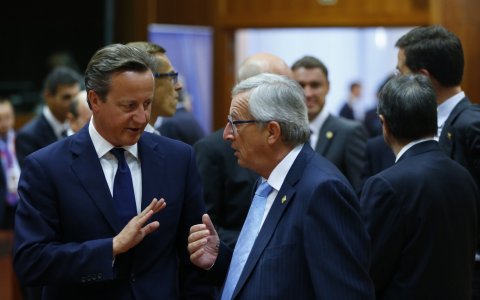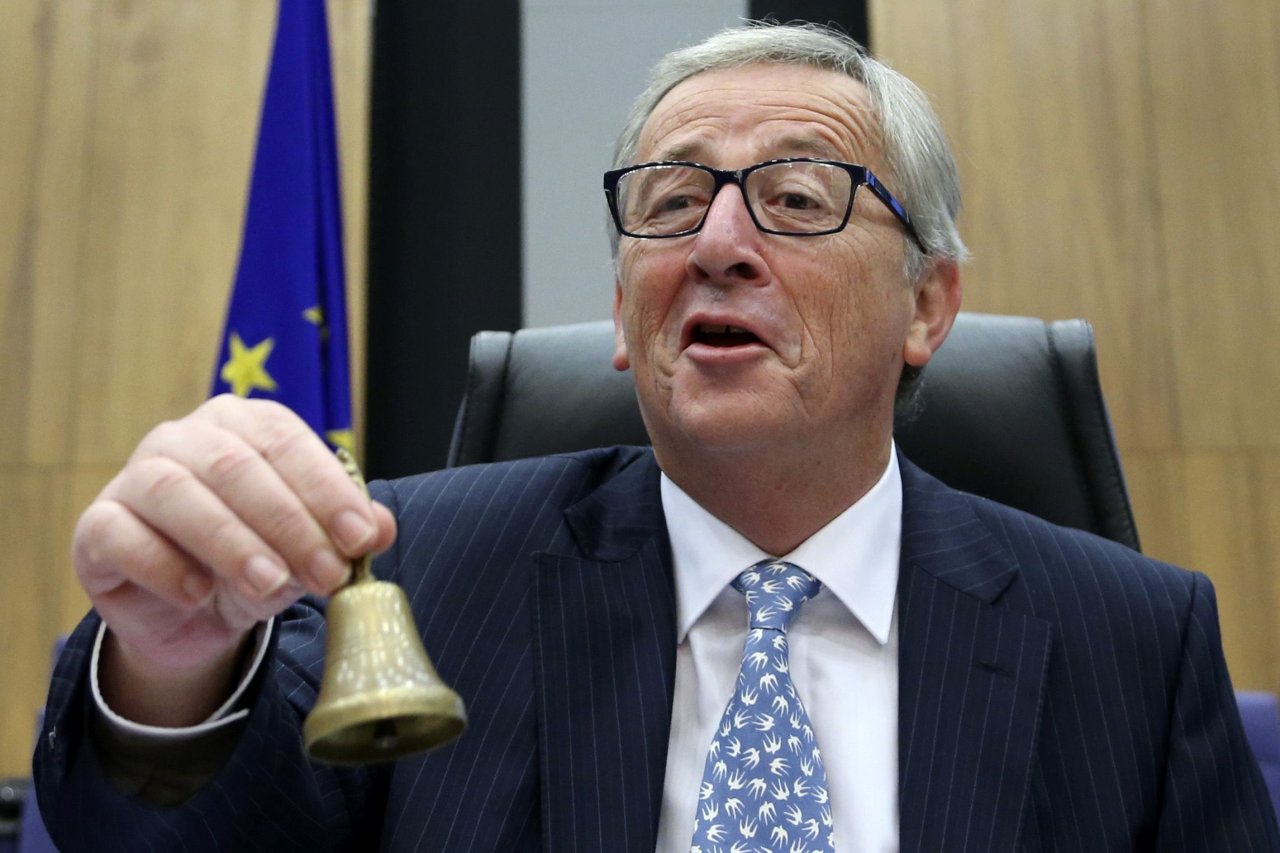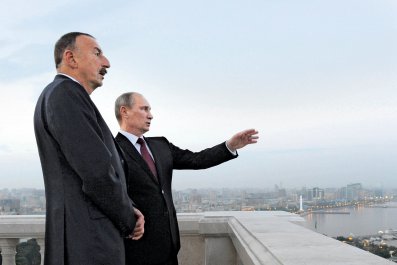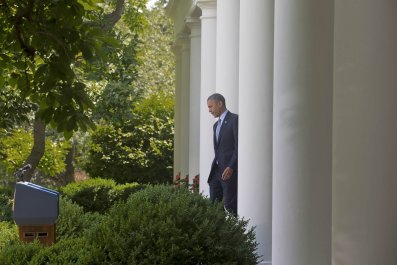Like Nigel Farage, some of the charm of Jean-Claude Juncker (sometimes known as 'Johnny'), lies in his declining to speak like a politician. That, however, is where the similarities between the UK Independence Party leader and European Commission president end.
"I'm for dark, secret debates," said Juncker in 2011, as leader of the Eurogroup, the Eurozone finance ministers trying to secure the fate of the common currency. Ahead of France's referendum over the EU constitution in 2005, he declined to fret: "If it's a yes, we will say 'On we go', and if it's a no we will say 'We continue'." And last spring he corrected an earlier quip, that European heads of government "all know what to do [to solve the Euro crisis], we just don't know how to get re-elected after we've done it." This time he joked, "For a long time, we didn't know what to do, and we still weren't re-elected."
But if his critics see Juncker as the ultimate anti-democratic Brussels bureaucrat – and, indeed, he's long been a European fixture, a well-known name across the continent since the 1990s – it seems politics is protecting him now.
For more than a fortnight, Juncker has been under pressure over a trove of leaked documents showing the degree to which Luxembourg aided and abetted corporate tax avoidance over the past 20-some years. A system of privately made, individually tailored deals granted more than 340 companies tax rates as low as 1% if they based themselves in the Royal Duchy, helping the 500,000-citizen country to become a world-leading financial and investment hub over the course of about 30 years– and robbing other countries of billions in tax revenues.
Juncker was Luxembourg's prime minister and finance minister during the two decades when these deals grew rampant. He has bragged about the role he played in luring corporations to the Duchy. And yet he is now leading the very institution meant to be probing the legality of these schemes and spearheading international agreements that would quash such practices. Newspapers across Europe have called on him to resign and politicians from the left and right are backing inquiries into the role he played in the tax arrangements. But European government leaders are another story: not one has suggested it is time for him to go. That is in part thanks to Juncker's network of personal contacts, built during a period of huge flux in Europe. He played a central role in drafting the Maastricht treaty and continued over the next decades to support European integration and introduction of the Euro, often as an informal diplomat brokering deals between other European leaders. His friends and allies come from across the political spectrum.
But Janis Emmanouilidis, director of studies at the European Policy Centre, argues reluctance among EU leaders to push out Juncker is also down to the sort of political pragmatism he himself is known for. "No one has the appetite to find a new Commission president." Juncker's nomination this summer was contentious, not least because of David Cameron's vociferous but ineffective protests against it. But it also had the feel of inevitability. In the past, the EU heads of government nominated a candidate independent of the outcome of the European parliamentary elections. Angela Merkel, for one, maintained that right – until doing so started to look rather backward amid a push toward a more democratic EU, wherein Commission presidents were put forward by the party controlling parliament. Following the 2013 parliamentary elections, centre-right parties won a majority and going against Juncker – the European People's Party's chosen candidate – started to feel rather anti-democratic.

The miserable prospect of finding a replacement and getting approval from the European Parliament goes a long way to explaining the support Juncker is now getting in European capitals. Last week, Wolfgang Schäuble, Germany's finance minister, called Luxembourg's tax deals "annoying" but cautioned against personalising the debate. Markus Henn, coordinator for the Tax Justice Network Germany, questions whether even Germany's Social Democrats, who are generally more ready to be critical on issues of tax, will attack, given it might risk a schism in their coalition with Merkel's Christian Democrats.
Moreover, argues Emmanouilidis, heads of government have an innate sense of what a politician can ride out. "Many have faced their own difficulties at the national level and found themselves in situations where they were under pressure to resign, and they have a gut feeling for when a situation might lead to someone needing to step down." The feeling seems to be that this is not one of those situations.
If anyone were to go against that grain, it might be Cameron, given his former stance against Juncker. But his original complaints centred round the Luxembourger's supposed Federalist approach to the European project, not around Luxembourg as a tax haven. The latter line of attack would be awkward to pursue given the UK's own efforts to attract companies via favourable tax arrangements – including, for example, tax breaks on profits earned from patents, similar to legislation passed in Luxembourg by Juncker's government.
Richard G Whitman, a professor of politics and international relations at the University of Kent and associate fellow at Chatham House, sees a different reason for Cameron not going for the jugular. In the wake of the Rochester by-election and in the lead-up to a general election next year, "he wants to keep Europe off the front pages. The recent shadow of the past shows that problems in Europe don't convert into a bounce for Cameron. Instead, they just reinforce what Ukip says." So far, Juncker himself has responded to the scandal less like a seasoned politician accustomed to wrangling with an aggressive press corps, and more like the premier of a small, tame country – or, you might say, like a bureaucrat in blinders. Journalists writing about the leaked documents offered him a chance to comment as early as September; his office requested more time, was given it, delayed again in October, and yet still failed to come up with a robust response ahead of publication this month. After the stories were out, Juncker waited another week to respond. When he did, he took "political responsibility" for Luxembourg's behaviour under his watch but insisted that the tax department that granted the so-called special statements had acted "autonomously". Whitman believes no less than a smoking gun explicitly linking Juncker to the secret deals would unseat him. Pressure might also grow if some of the deals turn out, on closer examination, to have been illegal after all – if, for example, investigators are able to show that even the tiny operations that companies set up in Luxembourg to establish tax residency were shams. One politically astute response to calls for his resignation might be to pursue tax reforms with vigour. Tax reformers are not hopeful of this happening. "Juncker leading a campaign against tax avoidance would be like the Pope leading a campaign against Catholicism," says Nicholas Shaxson of the Tax Justice Network.
"On the one hand, he now can't ignore this," says Henn. "But if there were another Commission president with no ties to Luxembourg, this person would be even stronger."

























